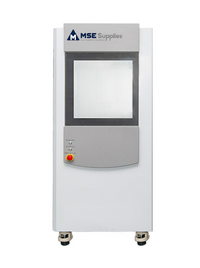Electrode Analysis
Electrode resistance influences the basic performance of batteries (power capability, reliability, safety, etc.). By measuring the electrode resistance and other related properties of electric conductive (such as micro structural uniformity of electrodes), we can evaluate the manufacture process in advance. In the composite electrodes, the electric conductivity is determined by several primary factors (interfacial resistance between the coating layer and the conductive foil, distributions of conductive agents, intrinsic resistance of active material, contact areas between particles, etc.).
Our system allows the users to measure the electrode resistance in effective and revolutionary ways. By using the information from the electrode resistance, the formulation of composite electrodes as well as the control parameters of mixing, coating and calendering processes can be optimized.
Our system for electrode analysis:
a. Battery Electrode Resistivity Analyzer
Cell Analysis (In-Situ Method)
Swelling behavior: During the lithium-ion batteries charging and discharging process, lithium ions are inserted and extracted in the negative electrode, which causes cells to expand and contract. These caused some serious problems including the swelling of the battery cell, deformation of the battery cell, fragmentation of material particles, rupture of the SEI film, and the consumption of electrolyte. The swelling behavior is an important indicator in evaluating the reliability of the battery. Therefore, we can optimize the battery cell module to ensure safety and to improve module space utilization by using the result of battery cell swelling behavior.
Gassing behavior: The gassing behavior will occur throughout the manufacturing process of lithium-ion batteries. It can be separated into three main processes: the formation of the lithium-ion batteries, overcharging, and long-term storage or cycling. The formation process will produce a large amount of gas that is related to the cell chemical system, anode and cathode materials, electrolyte components, and formation conditions. By effectively shortening the formation cycle, the production efficiency of the battery can be increased. Overcharging process side reactions cause a large amount of gas generation, which makes the battery volume or internal pressure increase rapidly (increase the risk of thermal runaway). By monitoring the in-situ swelling behavior, the safety issues can be minimized. Long-term storage or cycling causes side reactions and produce gas. By monitor this parameter, we can increase the reliability for lithium-ion batteries.
Our system can monitor the gassing/swelling process continuously with high stability. This unique in-situ analysis method can be used by researchers/manufacturers to analyze the cells' gassing/swelling behavior and the whole production processes, which allows researchers/manufacturers to design cells with better performance.
Our system for In-situ cell behavior analysis:
a. In-Situ Cell Swelling Analyzer
b. Pouch Cell In-Situ Gas Volume Analyzer
Battery Slurry Analysis
Slurry is an important intermediate product in the production of lithium-ion batteries. Its uniformity and stability have significant effects on the consistency and electrochemical performance of the final battery cell.
Our analyzer can evaluate slurry formulation (viscosity, dilution), conductive agent type, dispersant type and content, gel sedimentation (dwelling time), and many other properties. It can be used for monitoring the process stability by identifying the abnormalities in time and avoid the waste of time and cost caused by the defective products.
Our system for measuring battery slurry resistivity:










